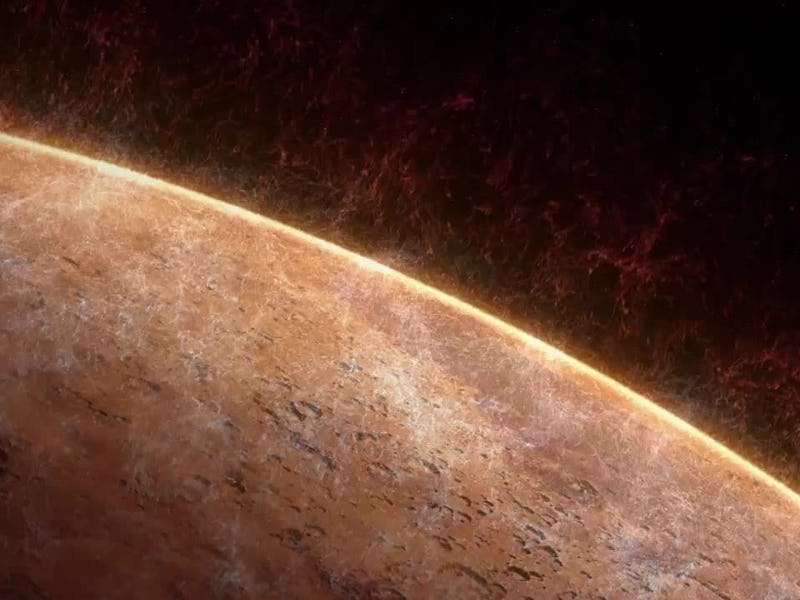Water May Have Ditched Mars Faster Than We Thought

Mars once had a lot more water, but thanks to atmospheric loss, hydrogen atoms escaped into space, removing most of its liquid water faster than originally thought and making it pretty much uninhabitable.
Long ago, Mars may have been warm enough to sustain life — a lot different than the cold, dry state it’s in today. In a study published in Nature Geoscience last Monday, researchers found hydrogen escaped Mars a lot quicker than they previously thought, and water at higher altitudes may have produced the large increase in the rate of hydrogen escaping.
“[Mars] may have been warm enough and have had enough water to sustain life on its surface, but it’s not clear how long does conditions persisted,” Mike Chaffin, a research associate at the University of Colorado Boulder’s Laboratory for Atmospheric and Space Physics and lead author of the study, tells Inverse. “We know early on in Mars’ history, it started to dry out. …This study addresses the question, how did this transition occur from warmer and wetter to cooler and dryer?
During the warmer southern summers of Mars, water molecules rise to the middle layers of the atmosphere and break apart from the sun’s ultraviolet rays, causing hydrogen to escape into space and leaving oxygen behind. And that’s why Mars is red — the oxygen reacted with the iron on Mars’ surface, causing Mars to rust.
Our understanding of water on Mars is pretty baffling. Researchers estimate that five-sixths of the water originally on Mars has escaped, and Mars’ atmosphere continues to lose hydrogen today. Chaffin’s theory explains why water may have escaped Mars. Other scientists recently found that Mars did not have enough carbon dioxide 3.5 billion years ago to even keep the planet warm enough to support liquid water. Yet we still know Mars did have lakes. The mysteries of water on Mars are only getting more confusing.
One way to explain what happened is that maybe Mars had always been cold, but it went through warm periods because of gases released by volcanoes. Another reason is greenhouse gas: A different team of researchers found that interactions between methane, carbon dioxide, and hydrogen created warm periods that allowed Mars to support liquid water. This might be true, as researchers aren’t sure yet if these hydrogen atom escapes have been happening all throughout Mars’ history.
Before, scientists believed hydrogen escaped at a slower and more steady rate, similar to Earth. But in 2007, the European Space Agency’s Mars Express and NASA’s Hubble Telescope first observed seasonal variations in Mars’ rate of hydrogen escape. Mars Express found that when the planet’s lower atmosphere warms up, water molecules actually rise higher into the atmosphere.
Hydrogen doesn’t escape Earth as quickly as it does Mars partly because the Earth’s atmosphere is thicker. In addition, Mars is much smaller. With less mass, it has less gravity, making it harder for the red planet to hold onto its own atmosphere. Earth also has active volcanoes, while as far as scientists know, there aren’t any right now on Mars.
“Those volcanoes are putting gas back into the atmosphere,” Chaffin says. “On Earth, we have this source of atmosphere that isnt present on Mars.”
Probes like the Mars Atmosphere and Volatile Evolution (MAVEN), which studies Mars upper atmosphere, and the ESA’s Trace Gas Orbiter, which will start studying lower altitudes in March 2018, could help confirm or disprove these findings.
What’s more, scientists will study planets around other stars, including Mars-sized planets. These findings may help researchers understand if this pattern of atmospheric loss (and possibly loss of life) exists on similar planets in other planetary systems.
“For me one interesting question is whether all Mars-sized planets dry out,” Chaffin says. “…This is probably happening on Mars-like planets throughout the universe. We can understand how planets throughout the universe evolved and changed and whether life is likely or whether conditions required for life can be found on those planets.”